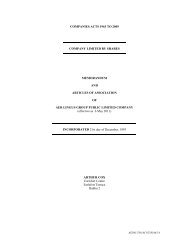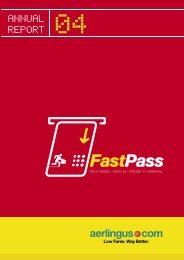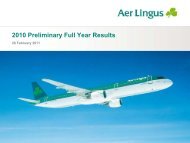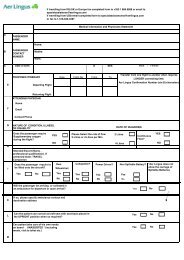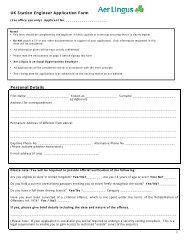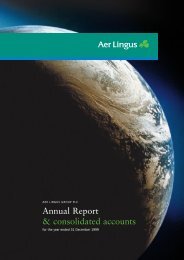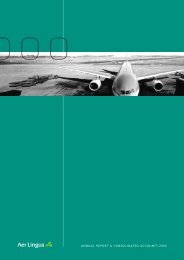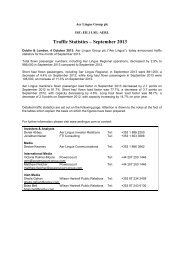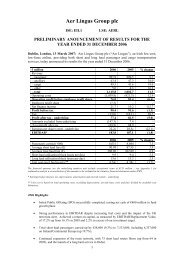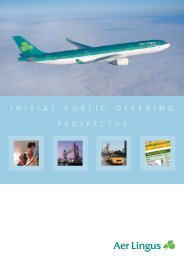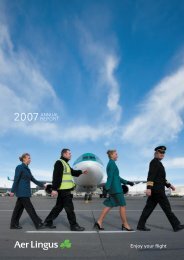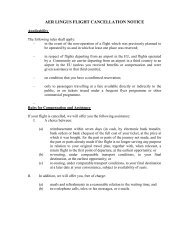annual report 2009 - Aer Lingus
annual report 2009 - Aer Lingus
annual report 2009 - Aer Lingus
Create successful ePaper yourself
Turn your PDF publications into a flip-book with our unique Google optimized e-Paper software.
Financial Statements <strong>Aer</strong> <strong>Lingus</strong> Group Plc – Annual Report <strong>2009</strong>632 Summary of significant accounting policies [continued]2.22 Revenue recognitionThe Group recognises revenue when the amount of revenue can be reliably measured, it is probable that the future economicbenefits will flow to the entity and when specific criteria have been met for each of the Group’s activities as described below.Revenue comprises the fair value of the consideration received or receivable for the sale of goods and services in the ordinary courseof the Group’s activities, and can be divided into scheduled passenger, cargo and ancillary revenue. Scheduled passenger revenue isshown inclusive of passenger charges and other fees to the extent that these are recovered directly from customers at the point of sale.Revenue is recognised as follows:(a) RevenuesScheduled passenger and cargo revenues are recognised when transportation is provided. The value of sales made for whichtransportation has not been provided at the statement of financial position date is included in ‘trade and other payables’ under thecaption of ‘ticket sales in advance’. Expired tickets are recognised as revenue using estimates based on historical trends. Fees chargedfor any changes to flight tickets are recognised as revenue immediately. Ancillary revenues are recognised in the income statementin the period in which the associated services are provided.(b) Frequent flyer revenueRedemption revenue received for the issuance of Gold Circle points is deferred as a liability until the points are redeemedor the passenger is uplifted in the case of flight redemptions.Redemption revenue is measured based on management’s estimate of the fair value of the expected awards for which the points will beredeemed. The fair value of the awards are reduced to take into account the proportion of points that are expected to expire (breakage).(c) Interest incomeInterest income is recognised using the effective interest method.(d) Dividend incomeDividend income is recognised when the right to receive payment is established.2.23 LeasesLeases in which a significant portion of the risks and rewards of ownership are retained by the lessor are classified as operating leases.Payments made under operating leases (net of any incentives received from the lessor) are charged to the income statement on astraight-line basis over the period of the lease.Leases of aircraft where the Group has substantially all the risks and rewards of ownership are classified as finance leases. Financeleases are capitalised at the lease’s commencement at the lower of the fair value of the leased aircraft and the present value of theminimum lease payments. Each lease payment is allocated between the liability and finance charges so as to achieve a constant rate onthe finance balance outstanding. The corresponding rental obligations, net of finance charges, are included in ‘finance lease obligations’.The interest element of the finance cost is charged to the income statement over the lease period so as to produce a constant periodicrate of interest on the remaining balance of the liability for each period. Certain lease contracts contain interest rate swaps that areclosely related to the underlying financing and as such, are not split out and accounted for as an embedded derivative. The aircraftacquired under finance leases is depreciated over the shorter of the useful life of the asset and the lease term.2.24 Exceptional itemsExceptional items are material items that derive from events or transactions that fall within the ordinary activities of the Group andwhich individually or, if of a similar type, in aggregate, are separately disclosed by virtue of their size or incidence. Such items mayinclude business repositioning costs, takeover defence costs, profit or loss on disposal of significant items of property, plant andequipment, litigation costs and settlements, profit or loss on disposal of investments and impairment of assets.Judgement is used by the Group in assessing the particular items which should be disclosed in the income statement and related notesas exceptional items.



